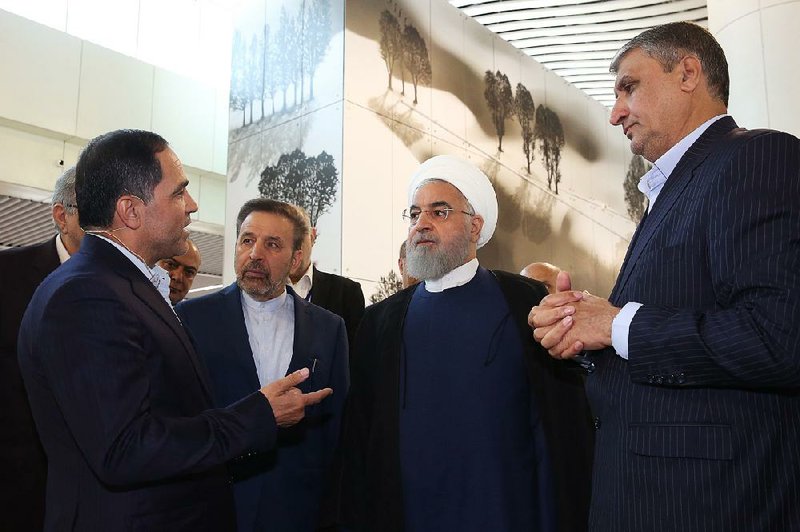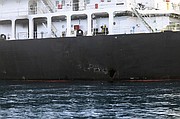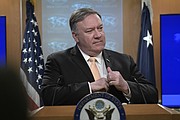WASHINGTON -- The United States and Iran said Tuesday that they were not seeking war with each other as tensions simmered between the two in the Persian Gulf.
"We have a lot of things going with Iran," President Donald Trump told reporters as he left the White House for a campaign event in Florida. "We'll see what happens. Let me just say this: We are very prepared."
Trump's comments came just hours after he announced the sudden departure of acting Pentagon chief Patrick Shanahan, jolting the Defense Department only a day after he signed off on sending an additional 1,000 troops to the Middle East to counter Iran.
On a visit Tuesday to U.S. Central Command in Florida, Secretary of State Mike Pompeo said he was confident the U.S. is taking the necessary steps to confront any challenge from Iran. He said the military is ready to respond to any attack by Iran on U.S. interests or Iranian disruption of international shipping lanes through which much of the world's oil supplies flow.
Pompeo said Trump wants only to re-establish a deterrent to Iranian threats.
"President Trump does not want war, and we will continue to communicate that message, while doing the things that are necessary to protect American interests in the region," he told reporters.
Pompeo said he made the trip to meet with commanders who would be responsible for any operations in the Persian Gulf to ensure that America's diplomatic and military efforts are coordinated "to make sure that we're in the position to do the right thing."
The "right thing," he said, "is to continue to work to convince the Islamic Republic of Iran that we are serious and to deter them from further aggression in the region."
In Iran, President Hassan Rouhani said "we do not wage war with any nation," but Iranians will withstand mounting U.S. pressure and prevail in the brinkmanship.
He added that despite the U.S. withdrawal last year from Tehran's 2015 nuclear deal with world powers, Iran had remained "loyal to its commitments, to ... international agreements."
But on Monday, Iran's nuclear agency announced that in the next 10 days it will surpass the uranium stockpile limits set by the nuclear deal, raising pressure on Europeans trying to save the accord a year after the U.S. withdrawal.
Hours later, the Pentagon announced that it was sending about 1,000 additional American troops to the Middle East to bolster security in the region in the face of what U.S. officials said was a growing threat from Iran.
In announcing the new deployment before he resigned, Shanahan said the forces are "for defensive purposes to address air, naval, and ground-based threats" in the Middle East.
"The United States does not seek conflict with Iran," Shanahan said, describing the move as intended "to ensure the safety and welfare of our military personnel working throughout the region and to protect our national interests." He said the U.S. will continue to adjust troop levels as needed.
The announcement by Iran's nuclear agency marked yet another deadline set by Tehran. Rouhani already has warned Europe that a new deal needs to be in place by July 7 or the Islamic Republic would increase its enrichment of uranium.
'VERY MINOR'
Tensions between Iran and the U.S. continued to build after two tankers were attacked last week near the Persian Gulf. The U.S. blames Iran, but the Iranians deny responsibility. With details murky and no one owning up to the attacks, the Pentagon released new photos intended to bolster its case.
But in an interview published Monday night, Trump characterized the attacks in the Gulf of Oman as "very minor" and suggested that the United States might not go to war to protect international oil supplies.
Trump's assessment in Time magazine reflected a softer posture than that of senior administration officials at the Pentagon and the State Department, as well as some congressional Republicans.
In the interview, Trump said he would "certainly" go to war to prevent Iran from getting a nuclear weapon.
"I would keep the other a question mark," he said when asked whether he would take military action in response to attacks on oil tankers.
"So far, it's been very minor," he told Time, referring to the most recent ones and other attacks the United States has blamed on Iran.
Trump told Time that the Gulf of Oman is less strategically important for the United States than it used to be.
"Other places get such vast amounts of oil there," he said. "We get very little. We have made tremendous progress in the last 2½ years in energy. ... So we're not in the position that we used to be in the Middle East where ... some people would say we were there for the oil."
Asked Tuesday morning about Trump's comments to Time, Air Force Gen. Paul Selva, vice chairman of the Joint Chiefs of Staff, said the movement of vessels in the area has changed very little and the maritime industry is still moving oil and petroleum products through the Strait of Hormuz and the Persian Gulf largely at the same volume as a couple of weeks ago.
"To the ship's masters, they are major attacks, right? If somebody puts a hole in your ship, that's a big thing. If somebody starts a fire on your ship, that's a big thing," Selva said. "In the scheme of the amount of shipping that moves through... two ships this week and four ships four weeks ago is a relatively small interruption in the movement of product through the Strait of Hormuz."
IRAN INCENTIVES
Meanwhile, in an effort to keep Iran's economy afloat and save the 2015 nuclear agreement, the Europeans are trying encourage other countries to buy more Iranian oil. They also have set up a barter-type system to evade possible U.S. sanctions.
"We have to do everything to solve the conflict situation with Iran in a peaceful manner," German Chancellor Angela Merkel said Tuesday. "We will do everything to impress on all sides, but especially to make clear to Iran, that this serious situation mustn't be aggravated."
The pact, which ensures that Tehran's nuclear program be restricted to civilian uses in exchange for sanctions relief, was signed by Iran, the U.S., Russia, China, France Germany and Britain. After Trump pulled out of the deal last year, the U.S. reimposed economic sanctions on Iran.
"We are relying on Iran continuing to abide by it," Merkel said. "If that isn't the case, that will of course have consequences."
Under pressure from U.S. sanctions once held in check by the deal, the value of Iran's currency has plummeted by about 60% in the past year. Inflation is up 37% and the cost of food and medicine has soared 40% to 60%, according to EU figures.
To get around possible U.S. sanctions, the Europeans have come up with a complicated barter-type system to skirt direct financial transactions with Iran. The workaround, dubbed Instex, would help ensure trade between Iran and Europe by allowing buyers and sellers to exchange money without relying on the usual cross-border financial transactions. It is not yet operational, although the EU promises that it will be "soon."
The EU also has introduced a "blocking statute" to protect European companies from the effects of U.S. sanctions, but many international corporations do more business in the United States than in Iran and have already severed ties with Tehran rather than risk running afoul of Washington.
The real problem, though, is oil. Iran's economy is not diversified and oil makes up about 80% of its exports. The country was selling 1 million to 1.5 million barrels a day a year ago, and is only selling 600,000-700,000 now, according to EU estimates.
But EU member states use little Iranian oil. China, another signatory to the nuclear deal, India and perhaps Turkey could buy more, so the Europeans are using diplomatic channels to encourage them to do so.
Last month, the U.S. ended waivers that allowed some countries to continue buying Iranian oil and deployed the USS Abraham Lincoln aircraft carrier battle group to the Persian Gulf.
It also sent four nuclear-capable B-52 bombers to Qatar and deployed more Patriot air-defense systems in response to what it said were indications of possible Iranian attacks.
Information for this article was contributed by Matthew Lee, Lorne Cook, Frank Jordans and Nasser Karimi of The Associated Press; and by John Wagner, Paul Sonne and Karen DeYoung of The Washington Post.
A Section on 06/19/2019


